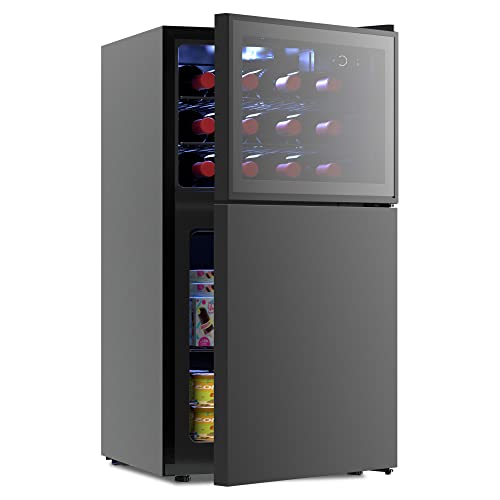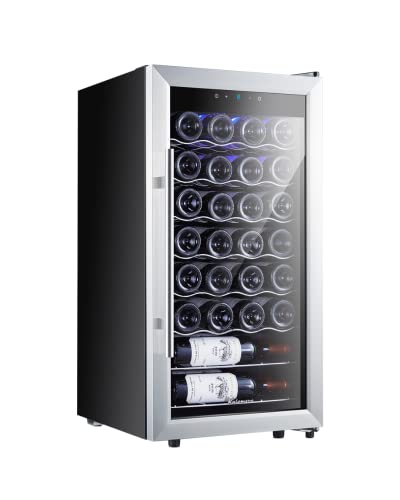
Choosing a Beverage and Wine Refrigerator
This dual-zone refrigerator is ideal for cooling and storing both beer and wine. It can be built-in or freestanding, with a sleek seamless door that looks stunning in any space.
Although vibration is generally harmless but it can disrupt a bottle's sediment and cause complex chemical reactions that are less apparent. In time, this can reduce esters and produce dull flavors.
Humidity Control
Humidity is the amount water vapor present in the air. It varies throughout the day because of a variety of factors. Temperature, precipitation, and winds can all have a significant impact on humidity levels. Achieving the right level of humidity is essential for a variety of reasons. Humidity plays a role in the weather patterns, indoor air quality and even storage of wine. Many aromatic compounds in a wine are affected by humidity changes. When humidity is too high, it may affect the balance of these substances and alter the taste of a wine. A wine refrigerator can help keep the right level of humidity to preserve the taste of a bottle.
A wine fridge can also aid in preventing the deterioration of corks, and ensure that the seal is secure. If humidity is too low, corks will dry out and allow oxygen into the bottle, accelerating the aging process and altering the wine's flavor. A wine refrigerator can help maintain an average humidity of 55% to 75 percent to stop this from occurring.
Wine coolers are also a great option to store wine and beer. A wine cellar is primarily designed to be used for long-term storage. They usually have designated spaces for beer bottles so that you can store your favorite craft beers or lagers right close to your preferred wines. These units are designed to balance temperature and humidity in order to avoid condensation, which can cause damage to labels and packaging.
Most models have a hygrometer that allows you to monitor and adjust humidity levels in your wine cooler. You can also use a humidifier to increase the humidity inside your
wine rack and fridge refrigerator.
If you choose to use a wine fridge, place the dehumidifier in a space that is separate from it. This will ensure that the dehumidifier will not absorb any of the wines or beers you're storing in your fridge. If you plan to keep your wine for a long duration, controlling humidity is vital. For a brief period of time, you might not notice any changes in your wine, but over the course of months or years the absence of humidity can dramatically alter the flavor profile of your wine.
Vibration Absorption
The vibrations that occur inside the wine fridge can affect the natural aging process of stored wines. Even tiny vibrations can cause sediment to move inside the bottle, triggering complicated chemical reactions that diminish esters and ruin wine's flavor in time. All La Sommeliere units have a vibration absorption system that helps reduce the sound and tremors which allows your wine to age peacefully and efficiently.
Despite the fact that wine refrigerators produce less noise than conventional refrigerators, the fans and circuits for refrigerant found in many units are still susceptible to producing noise. It is essential to follow the clearance guidelines and place your wine cooler in a quiet location away from other sources of noise.
Additionally, it is also recommended to regularly clean your wine cooler using an anti-abrasive cleaner and to allow the unit to "air out" before loading it with bottles. This will help reduce dust and dirt that may build up in the air vents.
If you notice that the wine fridge is making loud noises, it could be caused by a malfunctioning compressor or
electric wine chiller fan. The compressor is typically located in the back of the wine fridge and if it is placed in an unbalanced position or hits something behind it, it can shake itself loose from its rubber mounts, which can cause loud humming noises.
The compressor wine cooler operates as a normal fridge, compressing air molecules electronically, which decreases their temperature. They then blow throughout the interior of your refrigerator. This kind of cooling is much more energy efficient than other cooling methods like frost-free or evaporator refrigerators. Wine coolers that use compressors are loud and require more frequent maintenance. Many consumers opt for thermoelectric wine chillers that don't make use of compressors.
Temperature Control
Like wine, beer has specific temperature requirements to ensure its flavor is maintained. This makes it important to choose a wine and beverage fridge with temperature controls that can be adjusted to allow you to store your drinks at the ideal serving and storage temperatures for each type. Dual-zone models are available with separate temperature zones for wine and beer bottles.
In general, the majority of beers are served cooler than wines. However, the best serving temperature for any given style depends on its nature and the method of making it. For example, wheat beers and pilsners are best enjoyed between 40 and 50 degrees Fahrenheit and IPAs, sours barleywines, and more robust ales should be served around 50 to 55 degrees Fahrenheit. If you let a beer warm too long it will develop a unpleasant "skunky" smell that can affect the enjoyment.
You'll want a wine refrigerator that has a temperature range suitable to your favorite reds and whites. Some wine refrigerators come with humidification features that prevent oxidation and keep the cork in good shape. Some wine refrigerators come with a UV-blocking glass specifically designed to prevent sunlight from affecting the wine and aging it prematurely.
The temperature control system in a refrigerator is powered by compressor technology or thermoelectric cooling. Compressor-powered units use vapor compression to lower temperatures inside the wine fridge and thermoelectric models depend on electronic convection fan that circulate cool air through the refrigerator. Most fridges use a combination of these technologies for the most effective results.
If you're considering buying a
wine and beverage fridge which uses compressor technology, look for one with shock pads that are vibration-resistant. This is because the rumble generated by compressors could interfere with the normal maturing process of wine and speed up oxidation.
Although you can purchase an appliance that is specifically designed for wine, you might find it more cost-effective to shop for a standard refrigerator, or even a standard refrigerator that has a large interior with movable shelves and plenty of door storage. You can customize the space to fit a variety of bottles and cans, which include wine, beer and other beverages.
Storage Options
Consider a beverage cooler If you love hosting events. These fridges store cans and bottles of wine and beer with other cold drinks like water and soda. They're available as freestanding and built-in models. Built-in models can be integrated into cabinets or under counters in kitchens that have limited space.
Both kinds of fridges are available in a wide range of sizes and designs that make them ideal for most homes. Find models with shelves that slide out to let you easily access your most loved vinos and brews. Some refrigerators have soft LED lighting that showcases your selection in a subtle glowing, soft glow. Some refrigerators have a humidity control feature. This feature can prevent the formation of frost inside the
top rated wine refrigerators and beer bottles so that you can enjoy them without worry.
Dual-zone refrigerators are able to store your favorite wines at the ideal temperature to serve. You can also store craft beers in the separate zones, because it is able to maintain similar temperatures to a wine bottle. A dual zone wine refrigerator can accommodate larger bottles of beer or spirits than a typical refrigerator.
The right storage conditions can prolong the shelf life of your beer and wine, so make sure to keep them in a well-ventilated space that provides adequate light protection. The refrigerator must also be free of odors, dust and other debris that could impact the flavor of your drinks as time passes.

If you're keeping a large collection of wines and you want to preserve their quality, consider a cellar refrigerator. This kind of refrigerator is made to be used for long-term storage. It operates at a higher temperature than a wine fridge, which lets your bottles age with their best flavor. A cellar refrigerator also includes a humidifier to maintain the right humidity levels. This makes sure that the cork remains humid and inert. It also stops external air and notes of food from your refrigerator from entering the bottle and deteriorating it over time.



